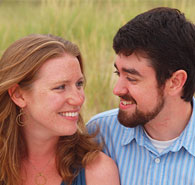Becoming a Family
In less than two months, I – Anthony Rennekamp – will publicly say the following words to Sara Suchy: “I, Anthony Michael, take you, Sara Rose, to be my wife. I promise to be true to you in good times and in bad, in sickness and in health. I will love you and honor you all the days of my life.” At the moment she says those words back to me, we will be married. Not only will we be married, at that very moment we will have started a new family.
In his 1994 Letter to Families, Pope Saint John Paul II reminds me that on the many paths that men and women take through life, “the family is the first and the most important. It is a path common to all, yet one which is particular, unique and unrepeatable, just as every individual is unrepeatable” (no. 2).
The family that Sara and I will become will be as unique as the families from which we originated, and to our new family we each bring unique experiences, expectations, joys and pains. Part of our marriage preparation was to talk to each other about our families of origin. We’ve had many long conversations about how we were raised. We discussed what we liked and didn’t like about our parents’ philosophies on topics like finances, child-rearing and lifestyle. In some areas we agreed right away, whereas in other areas, we had to spend a lot of time to communicate our points of view and identify why or how strongly we held them.
We both quickly learned that we cannot and should not try to recreate our family of origin. This seems obvious, but you’d be surprised how easy it is to fall into the comfort of the familiar, especially when it comes to thinking about how our family will look. We may not say it explicitly, but it is nearly impossible to imagine a family that looks all that different from the one we grew up in ourselves.
But, the fact is, the families that our respective parents cultivated are indeed “unique and unrepeatable.” There never has been and never will be another one like them. This means that, in a certain sense, we both have to leave the family that we love so dearly so that we can make our own family.
Jesus said, “A man shall leave his father and mother and be joined to his wife, and the two will become one flesh” (Matthew 19:5). When we say our vows to each other, we are saying not only that we will love and honor each other, but that, in a way, we trust the other person with our salvation. In other words, we trust that together we can – with God’s help – get each other and any souls entrusted to us to heaven.
That is a very tall order, and the kind of mandate that makes one stand with a certain degree of fear and trembling before this great Sacrament.
But that is the beauty of the Sacrament of Marriage, and why God ordered marriage in this particular way. We don’t do it alone.
From that moment forward, our life’s work will be to cultivate “the domestic Church,” a term used in ancient and modern times to emphasize the holiness of family life. Together we will learn to live little by little, day by day, the great drama of the Christian life. By loving each other, we learn to love God. By sacrificing for each other, we participate in Jesus’ sacrifice. By praying together, we learn to listen to God’s voice within our daily lives.
Our ultimate goal as human persons is to know and love God. My job as Sara’s husband and hers as my wife is to promote our growth in faith, hope and charity so that one day we – the created – will realize our truest desire of becoming one with our Creator.
“Dear families, you too should be fearless, ever ready to give witness to the hope that is in you (cf. 1 Pet 3:15), since the Good Shepherd has put that hope in your hearts through the Gospel. You should be ready to follow Christ towards the pastures of life, which he himself has prepared through the Paschal Mystery of his Death and Resurrection” (Letter to Families, no. 18).
May our family be fearless in Love.





